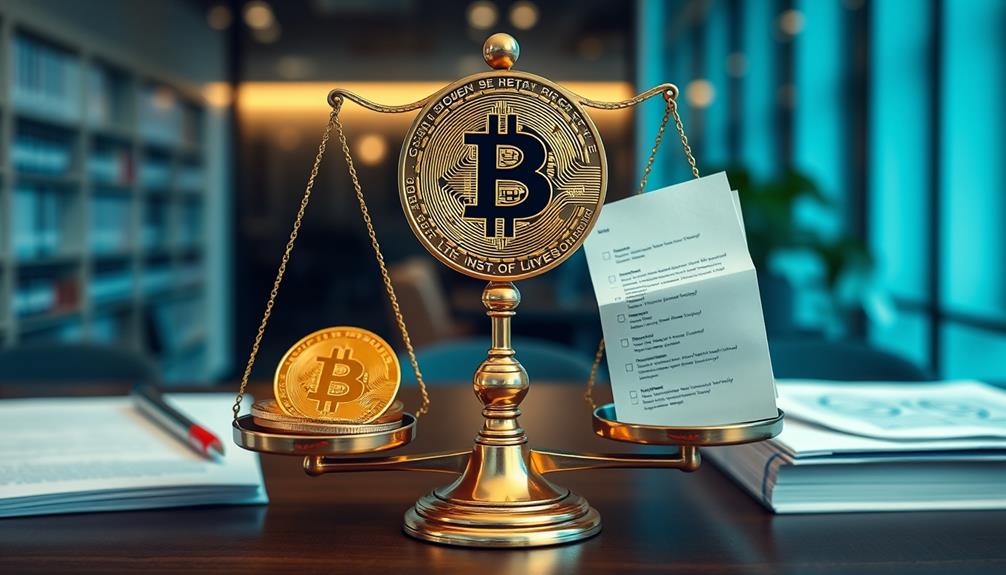When diving into Bitcoin IRAs, it’s crucial to grasp the legal and regulatory environment to steer clear of potential pitfalls. Federal and state rules define your duties, including IRS tax reporting mandates, as digital currencies fall under the property category. It’s important to uphold AML and KYC guidelines for compliance. The SEC monitors adherence to securities regulations, so stay alert to local laws. Remember the possible fluctuations in value, and proceed with caution. Keeping abreast of these intricacies will assist in managing your investments more efficiently. Unveiling these subtleties can optimize your approach and provide peace of mind. It is worth delving into these details to safeguard your investments effectively.
Key Takeaways
- Bitcoin IRAs combine traditional retirement savings with cryptocurrency investments, but they carry high risks and tax implications due to market volatility.
- The IRS classifies cryptocurrencies as property, requiring specific reporting and imposing capital gains tax on profits from these investments.
- Compliance with SEC regulations is essential for Bitcoin IRAs, ensuring adherence to securities laws and protection for investors.
- Custodians of Bitcoin IRAs must follow AML and KYC regulations to mitigate financial crime risks and maintain legitimacy in transactions.
- Staying informed about evolving regulations and conducting thorough due diligence on custodians is crucial for effective risk management in Bitcoin IRAs.
Overview of Bitcoin IRAs

Bitcoin IRAs offer a unique way for you to combine traditional retirement savings with the potential for high returns from digital assets. These tax-advantaged accounts allow you to invest in Bitcoin and other cryptocurrencies, giving you exposure to a market that has captured the attention of many investors.
With Bitcoin leading the cryptocurrency market and a market cap nearing $1.3 trillion as of 2024, it's no wonder that approximately 17% of U.S. adults are exploring Bitcoin IRAs to diversify their retirement portfolios. Many investors are also considering precious metal investments as a part of their retirement strategy, which can provide stability amidst the volatility of cryptocurrencies.
Self-directed IRAs (SDIRAs) are particularly useful for facilitating cryptocurrency investments, but keep in mind that not all custodians or brokers support crypto transactions within these accounts. This means you'll need to do your homework to find a provider that aligns with your investment goals.
While Bitcoin IRAs can potentially enhance your retirement savings, they also come with tax implications and high risks due to market volatility and regulatory uncertainties. As a result, conducting thorough due diligence on providers is essential.
Understanding these aspects helps you make informed decisions about your cryptocurrency holdings within a retirement framework.
Legal Framework for Bitcoin IRAs

When you're considering a Bitcoin IRA, it's vital to understand the regulatory landscape that governs these investments.
Similar to IRA rollovers to gold, you'll need to comply with specific requirements set by the IRS and SEC, which can impact how you manage your assets.
Plus, state regulations can vary, so knowing the rules in your jurisdiction is essential for legal compliance.
Regulatory Landscape Overview
The regulatory landscape for Bitcoin IRAs is complex and ever-evolving, primarily shaped by federal and state authorities. The Internal Revenue Service (IRS) treats cryptocurrencies as property for tax purposes, which means you need to comply with specific reporting obligations. Additionally, the Securities and Exchange Commission (SEC) guarantees that Bitcoin IRA investments adhere to securities laws, holding custodians accountable.
State regulations can greatly differ, so it's vital to understand local laws governing Bitcoin IRA custodians. These custodians must also comply with Anti-Money Laundering (AML) and Know Your Customer (KYC) regulations to operate legally and mitigate financial crime risks.
Here's a quick overview in the table below:
| Regulatory Authority | Key Responsibilities |
|---|---|
| IRS | Tax treatment of cryptocurrencies |
| SEC | Oversight of securities laws for investments |
| State Authorities | Licensing requirements for custodians |
As the landscape continues to evolve, you should stay informed about potential changes that may enhance investor protection and clarify compliance guidelines. Understanding these regulatory aspects is vital for anyone considering a Bitcoin IRA.
Compliance Requirements Explained
Steering through compliance requirements for Bitcoin IRAs can feel overwhelming, but understanding the legal framework is vital for both investors and custodians.
It's important to stay informed about risks and rewards of Bitcoin IRAs to navigate these complexities effectively. Here are some key areas you need to focus on:
- IRS Guidelines: Recognize that cryptocurrencies are classified as property for taxation, meaning you have specific reporting obligations.
- Anti-Money Laundering (AML) and Know Your Customer (KYC): Bitcoin IRA custodians must comply with these regulations to prevent fraud and guarantee transaction legitimacy.
- Securities Laws: Understand that regulatory bodies like the SEC oversee Bitcoin IRA investments, enforcing compliance to protect you as an investor.
- State-Specific Licensing: Each state has distinct licensing requirements for Bitcoin IRA custodians, so you must be aware of local regulations to guarantee full compliance.
SEC Guidelines Impact
Maneuvering the legal landscape of Bitcoin IRAs requires a solid grasp of SEC guidelines, which play a significant role in shaping how these investments function. The SEC regulates cryptocurrencies and Bitcoin IRA investments, ensuring compliance with federal securities laws that impact asset management within retirement accounts.
These guidelines cover various aspects, including the treatment of initial coin offerings (ICOs) and the classification of specific digital assets as securities. As with Gold IRAs, understanding the regulatory framework is vital for safeguarding your investments.
For you as an investor, understanding SEC compliance is essential. It not only helps you avoid legal repercussions but also enhances investor protection, especially in the rapidly evolving cryptocurrency market.
Custodians, responsible for managing your Bitcoin IRA, must adhere to these regulations to maintain transparency and accountability. The SEC has issued warnings regarding the risks associated with self-directed IRAs, emphasizing the importance of due diligence when selecting custodians and investment platforms.
Key Regulatory Bodies Involved

Steering through the complex landscape of Bitcoin IRAs requires an understanding of the key regulatory bodies that govern cryptocurrency investments.
As with any investment, having a solid grasp of financial terms like investment and risk tolerance can enhance your decision-making process.
Here are four major players you should know:
- Securities and Exchange Commission (SEC): This body oversees the legality of cryptocurrency investments, guaranteeing compliance with securities laws related to Bitcoin IRAs.
- Internal Revenue Service (IRS): The IRS classifies cryptocurrencies as property, imposing tax obligations on transactions and requiring you to report gains and losses from your Bitcoin IRA investments.
- Commodity Futures Trading Commission (CFTC): The CFTC regulates futures and derivatives markets for cryptocurrencies, providing oversight to maintain market integrity for your Bitcoin-related investments.
- State Regulatory Framework: Each state has different licensing requirements for Bitcoin IRA custodians, making it essential for you to be aware of state-specific laws to guarantee compliance.
Additionally, custodians must follow anti-money laundering (AML) and Know Your Customer (KYC) regulations as mandated by the Financial Crimes Enforcement Network (FinCEN).
Understanding these regulatory bodies and their roles will help you navigate the intricacies of Bitcoin IRAs more effectively.
Compliance Requirements for Investors

Steering through the compliance requirements for Bitcoin IRAs is just as important as understanding the regulatory bodies involved. As an investor, you need to be aware of the responsibilities that come with managing your digital assets.
Bitcoin IRA custodians must comply with specific regulatory requirements, including Anti-Money Laundering (AML) and Know Your Customer (KYC) protocols. This guarantees that your investments are legally sound and secure.
Moreover, similar to gold investment assets, understanding the implications of asset classification is vital for effective asset management, especially when considering diversification strategies to minimize risk in volatile markets.
You have reporting obligations, too. It's essential to declare your cryptocurrency transactions on your tax returns and maintain accurate records for potential audits.
Remember, the IRS classifies cryptocurrencies as property, which means any gains from your Bitcoin IRA transactions are subject to capital gains tax. This necessitates careful tax planning on your part.
Additionally, compliance with state-level regulations can vary. Each state may impose unique licensing and operational requirements for Bitcoin IRA custodians, impacting the viability of your investments.
Understanding IRS Tax Implications

Understanding the IRS tax implications of your Bitcoin IRA is essential for ensuring compliance and maximizing your investment efficiency. Here are four key points to evaluate:
- Property Classification: The IRS treats cryptocurrencies like property, meaning any profits from sales or exchanges in your Bitcoin IRA are subject to capital gains tax. This classification aligns with how other asset classes, such as gold, are treated regarding tax obligations, providing a framework for understanding investment strategies.
- Withdrawal Taxation: Withdrawals are taxed differently based on your IRA type—traditional IRAs face ordinary income tax rates, while Roth IRAs allow for tax-free withdrawals if you've contributed after-tax dollars. This distinction can greatly impact your overall financial strategy, particularly when assessing Gold IRA rollover guides.
- Reporting Requirements: Since 2014, the IRS mandates reporting cryptocurrencies on tax returns, adding compliance obligations similar to stocks and bonds for Bitcoin IRA investors.
- Unrelated Business Taxable Income (UBTI): Earnings classified as UBTI can incur taxes up to 37%, which requires you to structure your investments carefully.
Failing to accurately report cryptocurrency transactions can lead to considerable penalties and legal issues.
To avoid these pitfalls, make sure you understand the tax treatment applicable to your Bitcoin IRA and maintain accurate records for full compliance with IRS regulations.
Risks and Challenges in Bitcoin IRAs

Investing in a Bitcoin IRA exposes you to several risks and challenges that can greatly impact your financial outcomes. One major concern is the extreme price volatility of Bitcoin and other cryptocurrencies, which can lead to dramatic price drops of up to 75% in short timeframes. This volatility can notably affect the value of your investments held in Bitcoin IRAs.
Additionally, you should consider free crypto opportunities that might complement your investment strategy.
Moreover, you'll face higher costs compared to traditional IRAs due to additional documentation and custodian fees, with transaction fees typically ranging from 1% to 2%. Security breaches and hacks pose further risks to your digital assets, making it imperative to conduct thorough due diligence on custodians and investment providers.
Navigating the complex regulatory landscape is essential. You must comply with IRS, SEC, and state-level regulations to avoid penalties and guarantee the legality of your Bitcoin IRA investments.
Future Trends in Regulation

As the landscape for Bitcoin IRAs becomes more intricate, staying informed about future regulatory trends is essential for investors.
With the growing demand for transparency in private equity, similar expectations are likely to emerge in the cryptocurrency sector, reinforcing the need for sector performance metrics in evaluating investment viability.
Here are four key areas to watch:
- Clear Guidelines for Custodians: Future regulations may establish clearer standards for custodians managing Bitcoin IRAs, promoting transparency and accountability.
- Enhanced Anti-Money Laundering (AML) Measures: Expect regulations to tighten around AML and Know Your Customer (KYC) requirements, addressing the risks tied to cryptocurrency transactions.
- Standardized Regulatory Frameworks: As cryptocurrencies gain traction, we might see more uniform regulations across states, making compliance simpler for both Bitcoin IRA providers and investors.
- Increased Investor Protection: With anticipated oversight, you can expect greater consumer protection measures, which could attract more institutional investment in Bitcoin IRAs, ultimately stabilizing the market.
Best Practices for Investors

When investing in Bitcoin IRAs, it's essential to focus on regulatory compliance and risk management.
Understanding the best practices for investors can greatly enhance your decision-making process.
Make sure you're working with a trustworthy custodian and stay updated on any changes in the law that could affect your investments.
Additionally, consider limiting your cryptocurrency exposure to balance potential rewards with the inherent risks involved.
Regulatory Compliance Essentials
Maneuvering the regulatory landscape of Bitcoin IRAs requires a solid understanding of compliance essentials to protect your investments.
Here are four key compliance practices you should follow:
- Choose Reputable Bitcoin IRA Custodians: Guarantee your custodian adheres to IRS regulations for secure storage and management of digital assets.
- Fulfill Reporting Obligations: Stay on top of tax implications related to your transactions and holdings to avoid penalties from the IRS.
- Understand Anti-Money Laundering (AML) Requirements: Be prepared for the Know Your Customer (KYC) regulations your custodian must comply with, which can affect your onboarding process.
- Stay Informed on Evolving Regulatory Frameworks: Regularly update yourself on state-specific regulations and SEC guidelines, as licensing requirements for Bitcoin IRA service providers can vary widely.
Risk Management Strategies
Investing in Bitcoin IRAs can be rewarding, but it also comes with its fair share of risks. To navigate these challenges effectively, you should implement robust risk management strategies.
Start by conducting thorough due diligence on Bitcoin IRA custodians. Evaluate their fees, security measures, and compliance with IRS regulations to mitigate potential risks.
Diversifying your crypto holdings within your IRA can also reduce exposure to market volatility. Experts suggest keeping your cryptocurrency allocation between 2% to 5% of your overall portfolio for a balanced approach.
Utilizing secure storage solutions, like cold storage or hardware wallets, is essential to protect your digital assets from hacks and security breaches that are common in the crypto space.
Stay informed about regulatory changes and compliance obligations, including Anti-Money Laundering (AML) and Know Your Customer (KYC) requirements. Ignoring these can lead to legal pitfalls.
Frequently Asked Questions
Is Bitcoin IRA Regulated?
Yes, a Bitcoin IRA is regulated, primarily by the SEC, which enforces securities laws. Custodians must follow anti-money laundering and Know Your Customer regulations, and state regulations vary, impacting compliance requirements across different areas.
Is Bitcoin IRA Legit?
Picture a roller coaster; that's your investment journey with a Bitcoin IRA. It's legit, offering tax advantages, but like any ride, it comes with bumps—volatility and security risks. Do your research to navigate safely.
How Does a Bitcoin IRA Work?
A Bitcoin IRA lets you invest in cryptocurrencies within a retirement account. You choose a custodian to hold your assets, fund the account through various methods, and manage investments on their platform, all while enjoying tax advantages.
Is Bitcoin IRA FDIC Insured?
No, a Bitcoin IRA isn't FDIC insured. Unlike traditional bank accounts, your cryptocurrency investments lack that protection, so you should understand the risks involved and guarantee your provider has adequate security measures in place.
Conclusion
In the ever-evolving landscape of Bitcoin IRAs, staying informed is your best defense against potential pitfalls. With regulatory scrutiny tightening faster than a hawk swooping down on its prey, understanding the legal framework and compliance requirements is essential. Don't let tax implications or risks catch you off guard. By following best practices, you can navigate this complex world with confidence and seize the opportunity to grow your retirement savings like never before.









